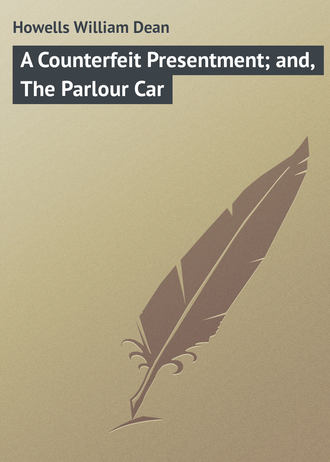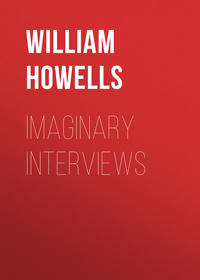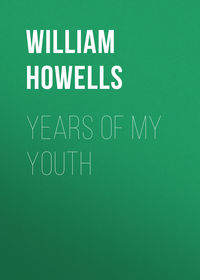 полная версия
полная версияA Counterfeit Presentment; and, The Parlour Car
Mrs. Wyatt.– "I'm afraid you've made a terrible mistake, James."
General Wyatt.– "Margaret! Don't say that!"
Mrs. Wyatt.– "Yes, it would have been better to show us this paper at once, – better than to keep us all these days in this terrible suffering."
General Wyatt.– "I was afraid of greater suffering for you both. I chose sorrow for Constance rather than the ignominy of knowing that she had set her heart on so base a scoundrel. When he crawled in the dust there before me, and whined for pity, I revolted from telling you or her how vile he was; the thought of it seemed to dishonour you; and I had hoped something, everything, from my girl's self-respect, her obedience, her faith in me. I never dreamed that it must come to this."
Mrs. Wyatt, sadly shaking her head. – "I know how well you meant; but oh, it was a fatal mistake!"
Constance, abandoning her refuge among the cushions, and coming forward to her father. – "No, mother, it was no mistake! I see now how wise and kind and merciful you have been, papa. You can never love me again, I've behaved so badly; but if you'll let me, I will try to live my gratitude for your mercy at a time when the whole truth would have killed me. Oh, papa! What shall I say, what shall I do to show how sorry and ashamed I am? Let me go down on my knees to thank you." Her father catches her to his heart, and fondly kisses her again and again. "I don't deserve it, papa! You ought to hate me, and drive me from you, and never let me see you again." She starts away from him as if to execute upon herself this terrible doom, when her eye falls upon the letter where she had thrown it on the floor. "To think how long I have been the fool, the slave of that —felon!" She stoops upon the paper with a hawk-like fierceness; she tears it into shreds, and strews the fragments about the room. "Oh, if I could only tear out of my heart all thoughts of him, all memory, all likeness!" In her wild scorn she has whirled unheedingly away toward Bartlett, whom, suddenly confronting, she apparently addresses in this aspiration; he opens wide his folded arms.
Bartlett.– "And what would you do, then, with this extraordinary resemblance?" The closing circle of his arms involves her and clasps her to his heart, from which beneficent shelter she presently exiles herself a pace or two, and stands with either hand pressed against his breast while her eyes dwell with rapture on his face.
Constance.– "Oh, you're not like him, and you never were!"
Bartlett, with light irony: "Ah?"
Constance.– "If I had not been blind, blind, blind, I never could have seen the slightest similarity. Like him? Never!"
Bartlett.– "Ah! Then perhaps the resemblance, which we have noticed from time to time, and which has been the cause of some annoyance and embarrassment all round, was simply a disguise which I had assumed for the time being to accomplish a purpose of my own?"
Constance.– "Oh, don't jest it away! It's your soul that I see now, your true and brave and generous heart; and if you pardoned me for mistaking you a single moment for one who had neither soul nor heart, I could never look you in the face again!"
Bartlett.– "You seem to be taking a good provisional glare at me beforehand, then, Miss Wyatt. I've never been so nearly looked out of countenance in my life. But you needn't be afraid; I shall not pardon your crime." Constance abruptly drops her head upon his breast, and again instantly repels herself.
Constance.– "No, you must not if you could. But you can't – you can't care for me after hearing what I could say to my father" —
Bartlett.– "That was in a moment of great excitement."
Constance.– "After hearing me rave about a man so unworthy of – any one – you cared for. No, your self-respect – everything – demands that you should cast me off."
Bartlett.– "It does. But I am inexorable, – you must have observed the trait before. In this case I will not yield even to my own colossal self-respect." Earnestly: "Ah, Constance, do you think I could love you the less because your heart was too true to swerve even from a traitor till he was proved as false to honour as to you?" Lightly again: "Come, I like your fidelity to worthless people; I'm rather a deep and darkling villain myself."
Constance, devoutly. – "You? Oh, you are as nobly frank and open as – as – as papa!"
Bartlett.– "No, Constance, you are wrong, for once. Hear my dreadful secret; I'm not what I seem, – the light and joyous creature I look, – I'm an emotional wreck. Three short years ago, I was frightfully jilted" – they all turn upon him in surprise – "by a young person who, I'm sorry to say, hasn't yet consoled me by turning out a scamp."
Constance, drifting to his side with a radiant smile. – "Oh, I'm so glad."
Bartlett, with affected dryness. – "Are you? I didn't know it was such a laughing matter. I was always disposed to take those things seriously."
Constance.– "Yes, yes! But don't you see? It places us on more of an equality." She looks at him with a smile of rapture and logic exquisitely compact.
Bartlett.– "Does it? But you're not half as happy as I am."
Constance.– "Oh yes, I am! Twice."
Bartlett.– "Then that makes us just even, for so am I." They stand ridiculously blest, holding each other's hand a moment, and then Constance, still clinging to one of his hands, goes and rests her other arm upon her mother's shoulder.
Constance.– "Mamma, how wretched I have made you, all these months!"
Mrs. Wyatt.– "If your trouble's over now, my child," – she tenderly kisses her cheek, – "there's no trouble for your mother in the world."
Constance.– "But I'm not happy, mamma. I can't be happy, thinking how wickedly unhappy I've been. No, no! I had better go back to the old wretched state again; it's all I'm fit for. I'm so ashamed of myself. Send him away!" She renews her hold upon his hand.
Bartlett.– "Nothing of the kind. I was requested to remain here six weeks ago, by a young lady. Besides, this is a public house. Come, I haven't finished the catalogue of my disagreeable qualities yet. I'm jealous. I want you to put that arm on my shoulder." He gently effects the desired transfer, and then, chancing to look up, he discovers the Rev. Arthur Cummings on the threshold in the act of modestly retreating. He detains him with a great melodramatic start. "Hah! A clergyman! This is indeed ominous!"
THE PARLOUR CAR.
A FARCE
Scene: A Parlour Car on the New York Central Railroad. It is late afternoon in the early autumn, with a cloudy sunset threatening rain. The car is unoccupied save by a gentleman, who sits fronting one of the windows, with his feet in another chair; a newspaper lies across his lap; his hat is drawn down over his eyes, and he is apparently asleep. The rear door of the car opens, and the conductor enters with a young lady, heavily veiled, the porter coming after with her wraps and travelling-bags. The lady's air is of mingled anxiety and desperation, with a certain fierceness of movement. She casts a careless glance over the empty chairs.
Conductor.– "Here's your ticket, madam. You can have any of the places you like here, or," – glancing at the unconscious gentleman, and then at the young lady – "if you prefer, you can go and take that seat in the forward car."
Miss Lucy Galbraith.– "Oh, I can't ride backwards. I'll stay here, please. Thank you." The porter places her things in a chair by a window, across the car from the sleeping gentleman, and she throws herself wearily into the next seat, wheels round in it, and lifting her veil gazes absently out at the landscape. Her face, which is very pretty, with a low forehead shadowed by thick, blonde hair, shows the traces of tears. She makes search in her pocket for her handkerchief, which she presses to her eyes. The conductor, lingering a moment, goes out.
Porter.– "I'll be right here, at de end of de cah, if you should happen to want anything, miss," – making a feint of arranging the shawls and satchels. "Should you like some dese things hung up? Well, dey'll be jus' as well in de chair. We's pretty late dis afternoon; more 'n four hours behin' time. Ought to been into Albany 'fore dis. Freight train off de track jus' dis side o' Rochester, an' had to wait. Was you goin' to stop at Schenectady, miss?"
Miss G., absently. – "At Schenectady?" After a pause, "Yes."
Porter.– "Well, that's de next station, and den de cahs don't stop ag'in till dey git to Albany. Anything else I can do for you now, miss?"
Miss G.– "No, no, thank you, nothing." The porter hesitates, takes off his cap, and scratches his head with a murmur of embarrassment. Miss Galbraith looks up at him inquiringly, and then suddenly takes out her porte-monnaie and fees him.
Porter.– "Thank you, miss, thank you. If you want anything at all, miss, I'm right dere at de end of de cah." He goes out by the narrow passage-way beside the smaller enclosed parlour. Miss Galbraith looks askance at the sleeping gentleman, and then, rising, goes to the large mirror, to pin her veil, which has become loosened from her hat. She gives a little start at sight of the gentleman in the mirror, but arranges her head-gear, and returning to her place looks out of the window again. After a little while she moves about uneasily in her chair, then leans forward and tries to raise her window; she lifts it partly up, when the catch slips from her fingers and the window falls shut again with a crash.
Miss G.– "O dear, how provoking! I suppose I must call the porter." She rises from her seat, but on attempting to move away she finds that the skirt of her polonaise has been caught in the falling window. She pulls at it, and then tries to lift the window again, but the cloth has wedged it in, and she cannot stir it. "Well, I certainly think this is beyond endurance! Porter! Ah – porter! Oh, he'll never hear me in the racket that these wheels are making! I wish they'd stop – I" —
The gentleman stirs in his chair, lifts his head, listens, takes his feet down from the other seat, rises abruptly, and comes to Miss Galbraith's side.
Mr. Allen Richards.– "Will you allow me to open the window for you?" Starting back, "Miss Galbraith!"
Miss G.– "Al – Mr. Richards!" There is a silence for some moments, in which they remain looking at each other; then,
Mr. Richards.– "Lucy" —
Miss G.– "I forbid you to address me in that way, Mr. Richards."
Mr. R.– "Why, you were just going to call me Allen!"
Miss G.– "That was an accident, you know very well – an impulse."
Mr. R.– "Well, so is this."
Miss G.– "Of which you ought to be ashamed to take advantage. I wonder at your presumption in speaking to me at all. It's quite idle, I can assure you. Everything is at an end between us. It seems that I bore with you too long; but I'm thankful that I had the spirit to act at last, and to act in time. And now that chance has thrown us together, I trust that you will not force your conversation upon me. No gentleman would, and I have always given you credit for thinking yourself a gentleman. I request that you will not speak to me."
Mr. R.– "You've spoken ten words to me for every one of mine to you. But I won't annoy you. I can't believe it, Lucy; I can not believe it. It seems like some rascally dream, and if I had had any sleep since it happened, I should think I had dreamed it."
Miss G.– "Oh! You were sleeping soundly enough when I got into the car!"
Mr. R.– "I own it; I was perfectly used up, and I had dropped off."
Miss G., scornfully. – "Then perhaps you have dreamed it."
Mr. R.– "I'll think so till you tell me again that our engagement is broken; that the faithful love of years is to go for nothing; that you dismiss me with cruel insult, without one word of explanation, without a word of intelligible accusation, even. It's too much! I've been thinking it all over and over, and I can't make head or tail of it. I meant to see you again as soon as we got to town, and implore you to hear me. Come, it's a mighty serious matter, Lucy. I'm not a man to put on heroics and that; but I believe it'll play the very deuce with me, Lucy, – that is to say, Miss Galbraith, – I do indeed. It'll give me a low opinion of woman."
Miss G., averting her face. – "Oh, a very high opinion of woman you have had!"
Mr. R., with sentiment. – "Well, there was one woman whom I thought a perfect angel."
Miss G.– "Indeed! May I ask her name?"
Mr. R., with a forlorn smile. – "I shall be obliged to describe her somewhat formally as – Miss Galbraith."
Miss G.– "Mr. Richards!"
Mr. R.– "Why, you've just forbidden me to say Lucy. You must tell me, dearest, what I have done to offend you. The worst criminals are not condemned unheard, and I've always thought you were merciful if not just. And now I only ask you to be just."
Miss G., looking out of the window. – "You know very well what you've done. You can't expect me to humiliate myself by putting your offence into words."
Mr. R.– "Upon my soul, I don't know what you mean! I don't know what I've done. When you came at me, last night, with my ring and presents and other little traps, you might have knocked me down with the lightest of the lot. I was perfectly dazed; I couldn't say anything before you were off, and all I could do was to hope that you'd be more like yourself in the morning. And in the morning, when I came round to Mrs. Phillips's I found you were gone, and I came after you by the next train."
Miss G.– "Mr. Richards, your personal history for the last twenty-four hours is a matter of perfect indifference to me, as it shall be for the next twenty-four hundred years. I see that you are resolved to annoy me, and since you will not leave the car, I must do so." She rises haughtily from her seat, but the imprisoned skirt of her polonaise twitches her abruptly back into her chair. She bursts into tears. "Oh, what shall I do!"
Mr. R., dryly. – "You shall do whatever you like, Miss Galbraith, when I've set you free; for I see your dress is caught in the window. When it's once out, I'll shut the window, and you can call the porter to raise it." He leans forward over her chair, and while she shrinks back the length of her tether, he tugs at the window-fastening. "I can't get at it. Would you be so good as to stand up, – all you can?" Miss Galbraith stands up, droopingly, and Mr. Richards makes a movement towards her, and then falls back. "No, that won't do. Please sit down again." He goes round her chair and tries to get at the window from that side. "I can't get any purchase on it. Why don't you cut out that piece?" Miss Galbraith stares at him in dumb amazement. "Well, I don't see what we're to do. I'll go and get the porter." He goes to the end of the car, and returns. "I can't find the porter – he must be in one of the other cars. But" – brightening with the fortunate conception – "I've just thought of something. Will it unbutton?"
Miss G.– "Unbutton?"
Mr. R.– "Yes; this garment of yours."
Miss G.– "My polonaise?" Inquiringly: "Yes."
Mr. R.– "Well, then, it's a very simple matter. If you will just take it off I can easily" —
Miss G., faintly. – "I can't. A polonaise isn't like an overcoat" —
Mr. R., with dismay. – "Oh! Well, then" – He remains thinking a moment in hopeless perplexity.
Miss G., with polite ceremony. – "The porter will be back soon. Don't trouble yourself any further about it, please. I shall do very well."
Mr. R., without heeding her. – "If you could kneel on that foot-cushion and face the window" —
Miss G., kneeling promptly. – "So?"
Mr. R.– "Yes, and now" – kneeling beside her – "if you'll allow me to – to get at the window catch," – he stretches both arms forward; she shrinks from his right into his left, and then back again, – "and pull, while I raise the window" —
Miss G.– "Yes, yes; but do hurry, please. If any one saw us, I don't know what they would think. It's perfectly ridiculous!" – pulling. "It's caught in the corner of the window, between the frame and the sash, and it won't come! Is my hair troubling you? Is it in your eyes?"
Mr. R.– "It's in my eyes, but it isn't troubling me. Am I inconveniencing you?"
Miss G.– "Oh, not at all."
Mr. R.– "Well, now then, pull hard!" He lifts the window with a great effort; the polonaise comes free with a start, and she strikes violently against him. In supporting the shock he cannot forbear catching her for an instant to his heart. She frees herself, and starts indignantly to her feet.
Miss G.– "Oh, what a cowardly – subterfuge!"
Mr. R.– "Cowardly? You've no idea how much courage it took." Miss Galbraith puts her handkerchief to her face and sobs. "Oh, don't cry! Bless my heart – I'm sorry I did it! But you know how dearly I love you, Lucy, though I do think you've been cruelly unjust. I told you I never should love anyone else, and I never shall. I couldn't help it, upon my soul I couldn't. Nobody could. Don't let it vex you, my" – He approaches her.
Miss G.– "Please not touch me, sir! You have no longer any right whatever to do so."
Mr. R.– "You misinterpret a very inoffensive gesture. I have no idea of touching you, but I hope I may be allowed, as a special favour, to – pick up my hat, which you are in the act of stepping on." Miss Galbraith hastily turns, and strikes the hat with her whirling skirts; it rolls to the other side of the parlour, and Mr. Richards, who goes after it, utters an ironical "Thanks!" He brushes it and puts it on, looking at her where she has again seated herself at the window with her back to him, and continues, "As for any further molestation from me" —
Miss G.– "If you will talk to me" —
Mr. R.– "Excuse me, I am not talking to you."
Miss G.– "What were you doing?"
Mr. R.– "I was beginning to think aloud. I – I was soliloquising. I suppose I may be allowed to soliloquise?"
Miss G., very coldly. – "You can do what you like."
Mr. R.– "Unfortunately that's just what I can't do. If I could do as I liked, I should ask you a single question."
Miss G., after a moment. – "Well, sir, you may ask your question." She remains as before, with her chin in her hand, looking tearfully out of the window; her face is turned from Mr. Richards, who hesitates a moment, before he speaks.
Mr. R.– "I wish to ask you just this, Miss Galbraith: if you couldn't ride backwards in the other car, why do you ride backwards in this?"
Miss G., burying her face in her handkerchief, and sobbing. – "Oh, oh, oh! This is too bad!"
Mr. R.– "Oh, come now, Lucy. It breaks my heart to hear you going on so, and all for nothing. Be a little merciful to both of us, and listen to me. I've no doubt I can explain everything if I once understand it, but it's pretty hard explaining a thing if you don't understand it yourself. Do turn round. I know it makes you sick to ride in that way, and if you don't want to face me – there!" – wheeling in his chair so as to turn his back upon her – "you needn't. Though it's rather trying to a fellow's politeness, not to mention his other feelings. Now, what in the name" —
Porter, who at this moment enters with his step-ladder, and begins to light the lamps. – "Going pretty slow ag'in, sah."
Mr. R.– "Yes; what's the trouble?"
Porter.– "Well, I don't know exactly, sah. Something de matter with de locomotive. We shan't be into Albany much 'fore eight o'clock."
Mr. R.– "What's the next station?"
Porter.– "Schenectady."
Mr. R.– "Is the whole train as empty as this car?"
Porter, laughing. – "Well, no, sah. Fact is, dis cah don't belong on dis train. It's a Pullman that we hitched on when you got in, and we's taking it along for one of de Eastern roads. We let you in 'cause de Drawing-rooms was all full. Same with de lady" – looking sympathetically at her, as he takes up his steps to go out. "Can I do anything for you now, miss?"
Miss G., plaintively. – "No, thank you; nothing whatever." She has turned while Mr. Richards and the porter have been speaking, and now faces the back of the former, but her veil is drawn closely. The porter goes out.
Mr. R., wheeling round so as to confront her. – "I wish you would speak to me half as kindly as you do to that darky, Lucy."
Miss G.– "He is a gentleman!"
Mr. R.– "He is an urbane and well-informed nobleman. At any rate, he's a man and a brother. But so am I." Miss Galbraith does not reply, and after a pause Mr. Richards resumes. "Talking of gentlemen: I recollect, once, coming up on the day-boat to Poughkeepsie, there was a poor devil of a tipsy man kept following a young fellow about, and annoying him to death – trying to fight him, as a tipsy man will, and insisting that the young fellow had insulted him. By-and-by he lost his balance, and went overboard, and the other jumped after him and fished him out." Sensation on the part of Miss Galbraith, who stirs uneasily in her chair, looks out of the window, then looks at Mr. Richards, and drops her head. "There was a young lady on board, who had seen the whole thing – a very charming young lady indeed, with pale blonde hair growing very thick over her forehead, and dark eye-lashes to the sweetest blue eyes in the world. Well, this young lady's papa was amongst those who came up to say civil things to the young fellow when he got aboard again, and to ask the honour – he said the honour– of his acquaintance. And when he came out of his state-room in dry clothes, this infatuated old gentleman was waiting for him, and took him and introduced him to his wife and daughter. And the daughter said, with tears in her eyes, and a perfectly intoxicating impulsiveness, that it was the grandest and the most heroic and the noblest thing that she had ever seen, and she should always be a better girl for having seen it. Excuse me, Miss Galbraith, for troubling you with these facts of a personal history which, as you say, is a matter of perfect indifference to you. The young fellow didn't think at the time he had done anything extraordinary; but I don't suppose he did expect to live to have the same girl tell him he was no gentleman."
Miss G., wildly. – "Oh, Allen, Allen! You know I think you are a gentleman, and I always did!"
Mr. R., languidly. – "Oh, I merely had your word for it, just now, that you didn't." Tenderly. – "Will you hear me, Lucy?"
Miss G., faintly. – "Yes."
Mr. R.– "Well, what is it I've done? Will you tell me if I guess right?"
Miss G., with dignity. – "I am in no humour for jesting, Allen. And I can assure you that though I consent to hear what you have to say, or ask, nothing will change my determination. All is over between us."
Mr. R.– "Yes, I understand that perfectly. I am now asking merely for general information. I do not expect you to relent, and in fact I should consider it rather frivolous if you did. No. What I have always admired in your character, Lucy, is a firm, logical consistency; a clearness of mental vision that leaves no side of a subject unsearched; and an unwavering constancy of purpose. You may say that these traits are characteristic of all women; but they are pre-eminently characteristic of you, Lucy." Miss Galbraith looks askance at him, to make out whether he is in earnest or not; he continues, with a perfectly serious air. "And I know now that if you're offended with me, it's for no trivial cause." She stirs uncomfortably in her chair. "What I have done I can't imagine, but it must be something monstrous, since it has made life with me appear so impossible that you are ready to fling away your own happiness – for I know you did love me, Lucy – and destroy mine. I will begin with the worst thing I can think of. Was it because I danced so much with Fanny Watervliet?"









